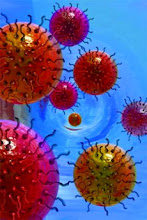
A year or two ago,(a decade now) I was involved in a debate with some smart people about water. This wasn’t a debate over water purity or the future scarceness of water, both of which are important and compelling topics, but something more fundamental. What is water? How are snowflakes formed? What do we call H2O structures? Does it fall under the category of “self assembly”?
One person on this committee didn’t think that water fell into the category of nanotechnology, and it lacked the size dependent properties that we use to define nanotechnology. It was deemed too simple and not as compelling as some of the other topics we were thinking about (nanoelectronics, gold nanoshells, quantum dots). However, we don’t really understand water and probing the interactions between water molecules is necessary before we can understand complicated structures and biological systems like transport through cell membranes.
However, if we think of the important characteristics of water like hydrogen bonding, solvation, and how it serves as the basis of life (along with some carbon and nitrogen), then we must realize that understanding the chemistry of water is essential to understanding the future of science. Research on water is not a trivial exploration and this study exemplifies some of the complexity of the substance we take for granted .http://pubs.acs.org/doi/abs/10.1021%2Fjp1060792
